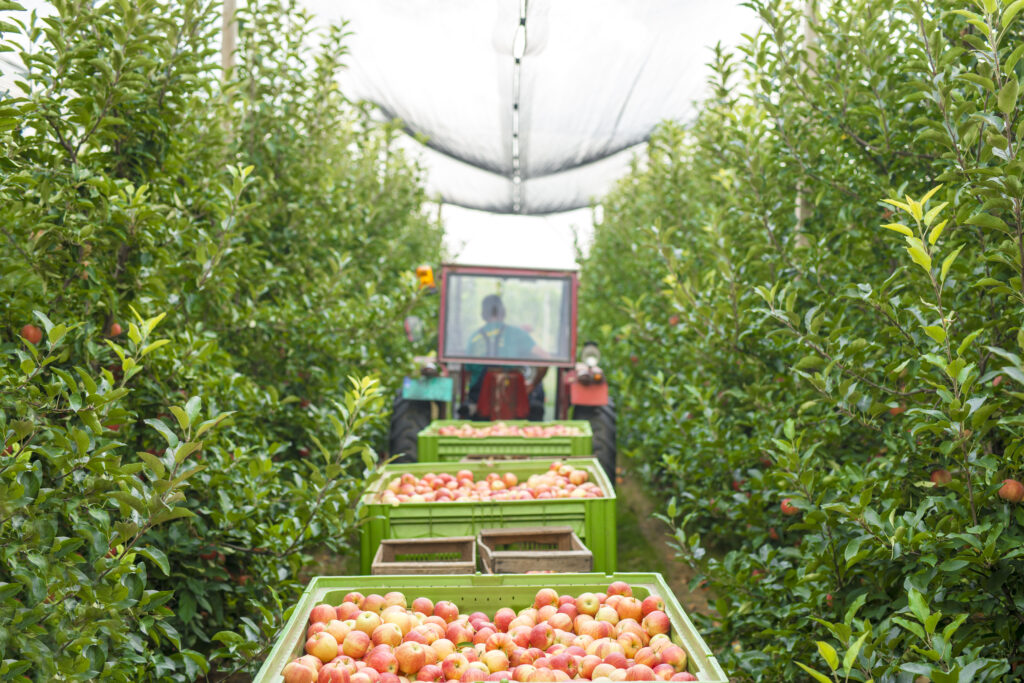The “Giant of Africa,” Nigeria, has a sizable agricultural sector with enormous potential to spur economic growth and development. The nation has abundant Agricultural resources thanks to its ideal climate and fertile soil, making it a good candidate for agricultural export. This article explores an important topic: How do agricultural exports affect Nigeria’s economic growth?
Nigeria’s agricultural export industry is essential to producing foreign exchange, supporting rural development, and providing job opportunities. Nigeria increases its position in the global market and supports its economic progress by exporting agricultural products. For decision-makers, farmers, business owners, and other players involved in Nigeria’s economic growth, understanding the complexities of this connection is essential.
An Overview of Nigeria’s agriculture export industry
Major agricultural export commodities:
Nigeria has a wide variety of agricultural goods that contribute considerably to the country’s export economy.
Who h includes;
- Crude Palm Oil,
- Cocoa,
- Rubber,
- Sesame Seeds,
- Cashew Nuts,
- Shea Butter,
- Cassava Products,
- Yams
These are among the most important agricultural export goods. These commodities have enormous export potential and have sparked interest locally and globally.
The economic contribution of agricultural exports to Nigeria:
The agricultural export industry is critical to the Nigerian economy. It contributes to the nation’s trade balance and fosters economic stability as a substantial source of foreign currency profits. Additionally, agricultural exports provide job possibilities, especially in rural regions where most farming happens. Because excess products may be exported while still fulfilling local demands, this industry also helps to ensure food security.
Obstacles and challenges facing the agriculture export industry:
Despite its promise, Nigeria’s agricultural export business has several obstacles that prevent it from expanding to its full potential. Farmers’ capacity to invest in contemporary Agricultural practices, infrastructure, and technology is constrained by limited access to capital and credit facilities. It is challenging to effectively transfer agricultural goods to local and foreign markets due to inadequate transportation and logistical infrastructure. Inconsistent rules and regulatory frameworks compound the difficulties that exporters confront. Furthermore, quality control concerns, post-harvest losses, and insufficient storage facilities are Major roadblocks to the sector’s growth.
Addressing these issues is critical to realizing the full potential of Nigeria’s agricultural export industry, supporting economic development, and enjoying the advantages of Agricultural commodity international trade. The government and stakeholders may collaborate to overcome these obstacles and create an enabling environment for the industry to prosper via Smart initiatives and effective policies.
The Relationship Between Agriculture Export and Economic Growth
Agricultural exports are critical in fueling Nigeria’s economic development. Let’s see how Agricultural exports contribute to the country’s economic growth.
The Role of Agricultural Export in Foreign Exchange Generation
Nigeria’s foreign currency revenues are primarily reliant on oil exports. But the unpredictability of oil prices, and the necessity to diversify the economy, have underlined the importance of agricultural export. Cocoa, cashew nuts, sesame seeds, palm oil, and rubber contribute considerably to foreign currency revenues. Nigeria may earn important foreign currency, normalize its trade balance, and lessen its reliance on oil income by exporting these items.
Employment generation and poverty reduction
Agricultural export can provide jobs and reduce poverty, especially in rural regions where agriculture is the predominant economic activity. Increased demand for Agricultural products, results from the rise of agricultural export markets. Necessitating the hiring of additional farmers, workers, processors, and transporters. This increase in employment improves lives, lowers poverty rates, and boosts economic activity in rural areas.
Impact on rural development and income distribution
Agricultural export may help rural development by expanding economic opportunities beyond subsistence farming. It encourages farmers to use modern agricultural methods, invest in infrastructure, and participate in value-added industries. Farmers may earn more money and enhance their level of life as agricultural exports rise. This, in turn, leads to more fair wealth distribution and narrows the urban-rural income divide.
Contribution to Economic Diversification and GDP Growth
Agricultural export has played a critical role in increasing Nigeria’s GDP and fostering economic diversification. By increasing Agricultural export markets, the industry contributes significantly to the country’s overall economic development. Diversifying the economy away from oil dependence and toward agriculture helps to reduce the risks associated with oil price volatility. Furthermore, a strong agricultural export industry encourages investment, increases productivity, and attracts foreign direct investment (FDI) in adjacent businesses such as processing and packaging.
Empirical Evidence on the Impact of agricultural export on economic growth in Nigeria

Studies and research findings
Numerous studies have been undertaken in Nigeria to investigate the link between agricultural export and economic development. These studies give important insights into the economic benefits of agricultural exports.
Positive effects on GDP growth, employment, and income
According to research results, agricultural exports have a key role in boosting GDP development in Nigeria. Exporting agricultural goods adds to overall economic growth by producing foreign currency revenues. This inflow of foreign exchange enhances the balance of payments and supports Economic stability.
Furthermore, agricultural export operations produce jobs, especially in rural regions where farming is the major source of income. Increased agricultural exports boost employment development across the value chain, from cultivation and processing to packaging, shipping, and distribution. Consequently, rising employment levels result in better income for agricultural persons and families.
Limitations and challenges in measuring the Impact accurately
Agricultural export has a revolutionary impact on Nigerian rural development. Farmers in rural regions are incentivized to adopt modern farming practices, invest in infrastructure, and gain access to better market prospects through encouraging agricultural output for export. These changes, such as greater access to essential services, higher living standards, and lower poverty rates, contribute to the overall development of rural areas.
Furthermore, increased agricultural exports alleviate income inequality and promote equitable economic development. Agricultural exports contribute to the equal distribution of wealth by offering income-generating possibilities for farmers and agribusinesses. This, in turn, contributes to lower poverty rates and higher living conditions for the people.
However, it is crucial to recognize that determining the exact influence of agricultural export on economic development is difficult. Market swings, global trade dynamics, and local policy may all have an impact on the results. As a result, ongoing study and monitoring are required to evaluate the efficacy of agricultural export programs and make informed policy choices.
Government policies and initiatives to promote agricultural export
Agricultural export is critical to Nigeria’s economic development, and the government recognizes its importance. Different regulations and efforts have been adopted recently to promote and assist the agricultural export industry. These policies are intended to address the obstacles and limits that farmers, agribusinesses, and exporters face while fostering an enabling climate for long-term development. Let’s look at some of the government’s initiatives:
Infrastructure and transportation investment:
Recognizing the significance of efficient transportation and logistics, the Nigerian government has invested in enhancing agricultural export infrastructure. This comprises the construction and upkeep of roads, ports, and airports to assist the transportation of Agricultural products from fields to export destinations. The government hopes to decrease post-harvest losses, cut transaction costs, and boost market access for farmers and exporters by improving transportation networks.
Support for agricultural research and development:
The Nigerian government has emphasized investment in agricultural research and development (R&D) to boost productivity and competitiveness in the agricultural export industry. This includes sponsoring research organizations, encouraging the use of sophisticated Agricultural practices, and assisting in creating high-yielding crop types. The government hopes to enhance agricultural methods, raise crop yields, and secure the supply of high-quality export commodities through financing R&D.
Trade policies and export incentives:
To encourage Agricultural exports, the government has implemented trade policies and export incentives. Tariff reductions or exemptions for agricultural supplies and equipment, export promotion schemes, and export financing programs are examples of these policies. The government hopes to attract investment, boost value addition within the industry, and promote the export of processed agricultural goods by offering these public-private incentives. Trade agreements and collaborations with other nations are also being explored to increase market access for Nigerian Agricultural exports.
Agricultural cooperatives and partnerships:
To promote development in the Agricultural export industry, the Nigerian government has fostered a partnership between the public and private sectors. Public-private partnerships (PPPs) promote information exchange, technology transfer, and agricultural investment. These alliances assist to improve the value chain, expand manufacturing capacity, and strengthen market ties. Furthermore, the government has encouraged the development of agricultural cooperatives, which allow smallholder farmers to pool resources, get access to loans, and participate in collective export operations. The government hopes to empower farmers and boost the broader sector by fostering these partnerships and cooperatives.
The government’s dedication to encouraging agricultural export via these policies and efforts highlights the sector’s ability to fuel Nigeria’s economic development. However, sustained support and execution of these policies, frequent review, and modification will be critical for maintaining and optimizing the Economic benefit of agricultural exports. Nigeria may further harness the full potential of its agriculture industry and assure a successful future by creating an enabling environment.
Conclusion
There are several recommendations to ensure the maximization of the effect of Agricultural export. Strengthening value chains, improving productivity, and enhancing access to finance and credit facilities are essential for the sector’s growth. Furthermore, promoting market access, trade facilitation, and investing in human capital and skills development will contribute to sustained economic growth.
In conclusion, the impact of agricultural export on economic growth in Nigeria cannot be overstated. The agricultural sector plays a vital role in the country’s economy, and its export activities have significant implications for overall development. Through agricultural exports, Nigeria can generate foreign exchange, create employment opportunities, reduce poverty, promote rural development, and contribute to GDP growth.












